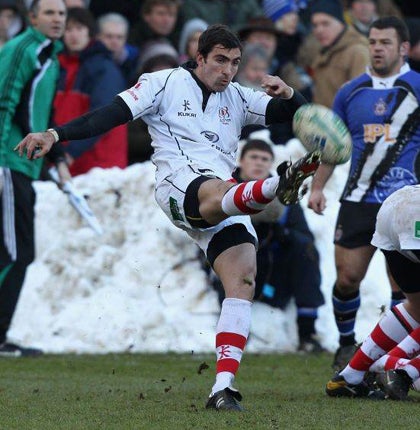Ambitious Ulster draw on peace dividend to compete with the best
The Heineken Cup quarter-finalists have lured South African talent to a growing rugby power

Outmuscled financially by the French – the Eurozone may be falling apart in the real world, but on Planet Rugby it goes from strength to strength – the last thing England's beleaguered Premiership clubs need as they attempt to restore their Heineken Cup credibility is a fresh threat from Ireland. Which is precisely what they face.
Ulster, who take on Northampton in the third of this weekend's quarter-finals, have set their sights on matching their more illustrious provincial rivals, Leinster and Munster, after a decade of playing second fiddle, and while they will start as underdogs on Sunday afternoon, they will not be outsiders for very much longer.
Any team resourceful enough to lure a player as accomplished as the Springbok back Ruan Pienaar across the Equator – not to mention South African Test forwards in B J Botha, Johann Muller and Pedrie Wannenburg – while engaging in a £20m stadium redevelopment in Belfast has more going for it than the average professional outfit attempting to make rugby pay in these islands. A combination of new-found ambition and external advantage unleashed by the success of the Irish peace process has led to the Ulstermen punching their weight more effectively than at any point since they won a devalued European title in the English boycott year of 1999.
Northampton, not short of ambition themselves but subject to a domestic salary cap that prevents them competing with the biggest spenders in rugby's market-place, can only look on with envy. They are playing this tie in Milton Keynes, rather than in their home surroundings of Franklin's Gardens, because their dysfunctional relationship with the local planning authority leaves them stuck with a 13,591-capacity stadium – 1,409 short of the tournament threshold for knockout fixtures. Ulster, meanwhile, will merrily tap into lavish amounts of public money as they extend their Ravenhill Stadium to 18,000 over the coming years.
"I hear all sorts of outlandish stories about what we're paying our players," said Shane Logan, the Ulster chief executive. "They're not accurate. We're very competitive in what we can offer people we believe to be right for us, but we don't spend more than we earn because the books have to balance.
"We are, however, increasingly confident that this is a place leading names will look to as a place to play, especially as the Magners League matures as a competition and we mature with it. While we haven't yet developed the pedigree and the aura that will allow us to turn up at the top English and French clubs and expect to win, we believe the cost of living here is attractive, especially for players with families, and will help us improve the quality of our squad. The old perception that this is not a pleasant place to live and work has gone."
Logan singled out the much-decorated Ireland outside-half David Humphreys, who wore the white No 10 shirt of his province in the '99 final, as a key figure in Ulster's renaissance. It was the 39-year-old lawyer, in his role as operations director, who talked Pienaar and company into heading for Belfast, rather than for some swankier city in the south of France – or, indeed, elsewhere in the Emerald Isle.
"We fell a long way behind Leinster and Munster after '99," Humphreys confessed. "Playing in front of 50,000 people at Lansdowne Road that day, with so many Ulstermen in Dublin... We didn't handle it well, and from where we found ourselves a couple of seasons back, we could have gone one of two ways: either we could let the other two provinces push on and accept a position in the second tier of a two-tier system, or we could try to push on with them. We're still a distance off, but this is easily the best Ulster squad I've seen in my 20 years here, and we're only in year one of the Pienaar-Muller era."
This weekend, the French have two quarter-finals all to themselves. The others are Anglo-Irish affairs, and if by any chance both should go the way of the teams across the water, England's outlook on the European front will be at its bleakest.
Subscribe to Independent Premium to bookmark this article
Want to bookmark your favourite articles and stories to read or reference later? Start your Independent Premium subscription today.

Join our commenting forum
Join thought-provoking conversations, follow other Independent readers and see their replies